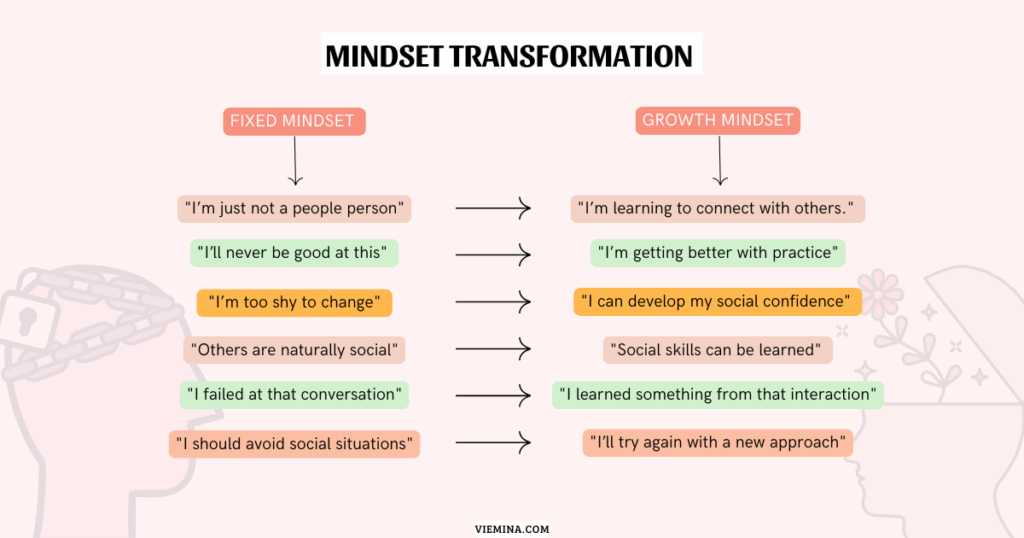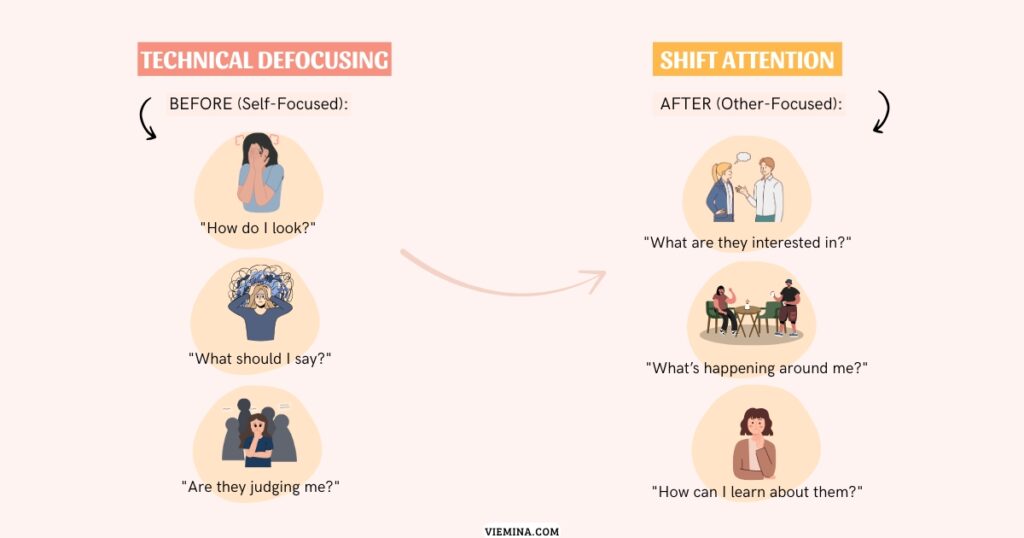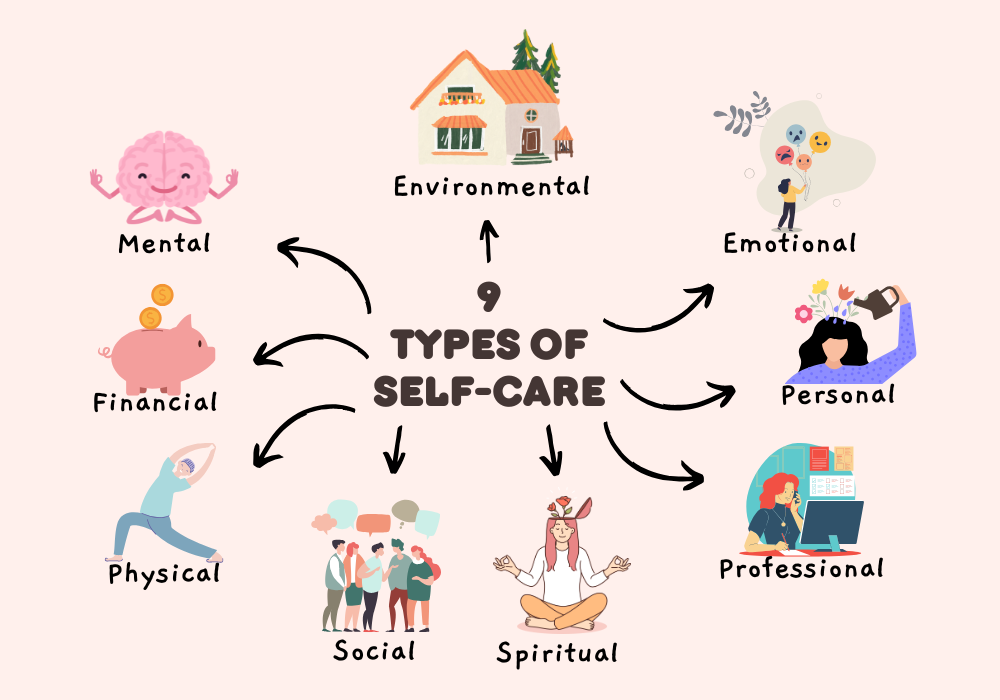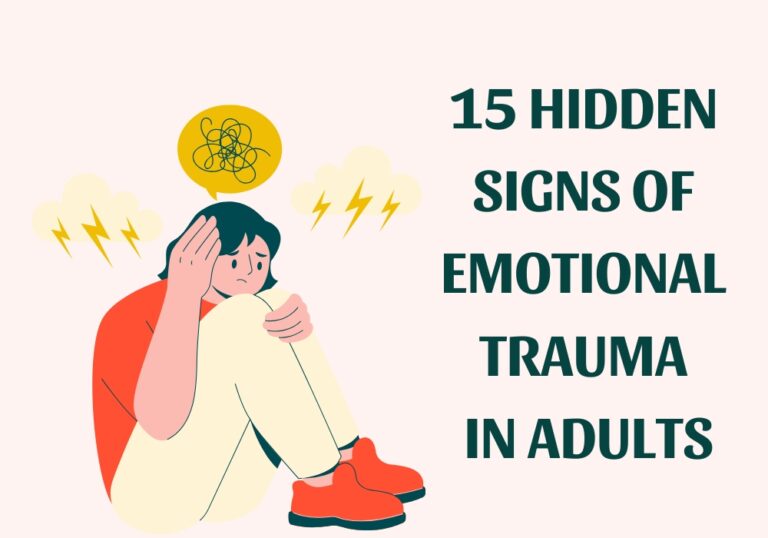Have you ever walked into a room full of people and felt like you wanted to disappear? Your heart races, your hands feel sweaty, and suddenly, talking to someone feels impossible. I know that feeling all too well. For years, I’d show up at parties or work events and quietly hope no one would notice me. I’d hang back, smile politely, and avoid eye contact—wishing I could be as confident as everyone else seemed to be.
That’s what shyness does. It makes you second-guess yourself, overthink simple conversations, and sometimes even avoid social situations altogether. Maybe you’ve done things like skipping lunch just to avoid a crowded break room or turning down invites because it just feels easier.
But here’s something important: shyness isn’t something you’re stuck with forever. It’s not a fixed part of who you are—it’s just a response, a habit, something that can change. And yes, you can learn how to overcome shyness.
The truth is, that shyness shows up differently for everyone. For some, it’s just a little awkward in new situations. For others, it feels like a big wall between them and the rest of the world. Wherever you fall on that scale, you’re not broken—and you’re not alone.
Got some good news? You can make small changes that matter. These changes can help you talk more, feel better about yourself, and try new things without holding back. It’s worth it—being able to connect with people, share experiences, and build bonds plays a key role in your happiness. It’s just as important as eating right or getting enough sleep.
If you’re done with staying on the sidelines or wishing things could change, this guide is here to help. Let’s explore how to overcome shyness in a way that feels straightforward, relatable, and gets results.
What is Shyness?

Shyness—a complex emotional response that affects approximately 40-50% of American adults.
Shyness is a feeling of discomfort, nervousness, or awkwardness experienced in social situations, particularly with unfamiliar people.
Unlike introversion, which is a personality preference for less stimulating environments, shyness involves fear and anxiety about social judgment. It’s characterized by self-consciousness, worry about how others perceive us, and a tendency to withdraw from social interactions.
Shyness vs. Introversion vs. Social Anxiety:
Shyness introversion, and social anxiety sometimes get mixed up, but they are not the same. Shyness means feeling uneasy or nervous when you’re around people strangers. It can show up as physical things like blushing, a fast heartbeat or sweating. Shy people might also avoid looking others in the eye or speak in a quiet voice.
Introversion is more about how someone prefers to spend their time. Introverts feel their best when they are alone and can need that alone time to feel refreshed even if they like being around others. As Susan Cain says, “There’s zero correlation between being the best talker and having the best ideas.”
Social anxiety exists on the more extreme side of the spectrum. It is a diagnosable mental health condition with an intense fear of being judged or embarrassed that can make everyday life harder to manage. Shyness is not the same—it gets better over time as someone feels more at ease. Social anxiety often needs help from a professional to improve.
| Characteristic | Shyness | Social Anxiety | Introversion |
| Definition | Discomfort in social situations | Fear of judgment in social settings | Preference for less stimulating environments |
| Physical Symptoms | Mild (blushing, increased heart rate) | Often severe (panic attacks, intense fear) | Minimal (energy depletion after socializing) |
| Impact on Daily Life | Manageable challenges | Can be debilitating | Natural part of personality |
| Treatment Approach | Practice and exposure | Often requires therapy | Acceptance and accommodation |
Related: Social Anxiety: Causes, Triggers, 11 Symptoms Explained
Related:8 Signs You Might Be an Introvert
What causes shyness? (Biological Reasons Behind Shyness)
Shyness happens because of both biological traits and life experiences. Studies reveal that 30% of shyness comes from genetics, while 70% comes from what you go through and where you grow up.
From a biological perspective, approximately 15% of infants are born with a tendency toward shyness. This innate predisposition involves differences in brain structure and function that make some people more sensitive to social stimuli.
Nonetheless, your environment plays the dominant role. Authoritarian or overprotective parenting often contributes to children developing shyness. Similarly, experiences of public humiliation, bullying, or frequent criticism can foster shy tendencies. Major life changes—such as moving to a new school or city—can also trigger shyness as a protective response.
Other causes Behind Shyness or Social Anxiety:
- Cognitive Patterns:
People can develop negative beliefs about themselves, pick up unhealthy ways of thinking about social situations, or learn anxious behaviors by watching nervous family members or friends. They might think in perfectionist ways or imagine the worst outcomes in social situations.
- Social Learning Factors:
Observing and modeling anxious behaviors from parents or caregivers, receiving negative feedback during critical developmental periods, lack of early socialization opportunities, and cultural messages that emphasize external validation over self-acceptance.
- Developmental Factors:
Changes in hormones during teenage years can make people feel more self-conscious. Limited interaction with peers can slow the growth of social skills. Comparing oneself to others in schoolwork or social settings as well as life changes like moving to a new place switching schools, or dealing with family problems, can all create additional challenges.
- Modern Digital Age Influences:
Excessive screen time reducing face-to-face social practice, social media comparison leading to inadequacy feelings, cyberbullying experiences, and decreased in-person communication skills due to digital communication preferences.
- Physical and Medical Factors:
Chronic illness or physical differences that affect self-image, speech impediments or learning disabilities, hormonal imbalances, certain medications that affect mood and energy levels, and sensory processing differences that make social environments overwhelming.
Why Shyness Isn’t Your Personality (Even If It Feels Like It):
If you’ve been shy for as long as you can remember, it might feel like it’s just part of who you are. But here’s the truth: **shyness is not your personality**. It’s a response—something your mind does in certain situations, often to protect you from feeling judged or uncomfortable.
Shyness isn’t set in stone. Many people who were shy as children grow out of it as they gain life experience and confidence. That alone proves it can change.
It also depends on the situation. You might feel shy around new people, but completely relaxed with close friends. That means it’s not who you are—it’s how you react in specific moments.
At the core of shyness are things like self-consciousness, fear of judgment, and negative self-talk. These aren’t personality traits—they’re thought habits. And habits can be changed with awareness and practice.
Understanding this is powerful. Once you see that **shyness is just a pattern—not your identity**—you’re already on your way to overcoming it.
13 Proven Strategies to Overcome Shyness:
1-Why Are You Shy?
Before you can learn *how to overcome shyness*, it helps to ask yourself a simple but powerful question: **Why am I shy in the first place?**
Shyness doesn’t come out of nowhere. For some people, it’s tied to **low self-esteem**—that little voice in your head that says you’re not interesting enough, smart enough, or good enough. For others, it might be **anxiety**, a fear of being judged, or just the discomfort of being in a new or unfamiliar situation.
Here’s the thing: once you figure out what’s really behind your shyness, you can start working on it directly.
Ask Yourself:
- What’s Triggering It?
- Do you feel intimidated around certain people?
- Are you afraid of saying the wrong thing?
- Is it a lack of confidence in your skills or appearance?
- Or maybe you’re just overwhelmed by the pressure of a new environment or role?
The more specific you get with your answers, the easier it becomes to tackle the root cause—not just the symptoms.
For example:
If you realize your shyness comes from **not believing in your abilities**, then working on self-confidence and positive self-talk could help.
If it’s about **feeling out of place in new settings**, then gentle exposure and building familiarity might do the trick.
The point is—**you’re not stuck like this**. Everyone has their reasons for being shy, but once you spot yours, you can take steps to move past it. One small insight can lead to a big breakthrough.
2-Develop a Growth Mindset About Social Skills:

Recognize that social skills, like any other skill, can be developed through practice. Instead of thinking “I’m not good at talking to people,” reframe it as “I’m learning to communicate more confidently.”
This mindset shift reduces the pressure of perfectionism and allows you to view social interactions as learning opportunities rather than tests of your worth.
3-Practice Small Talk in Low-Pressure Situations:
Start with brief, casual conversations in environments where you feel safe. Practice with cashiers, baristas, or neighbors. These low-stakes interactions help you build confidence without the pressure of maintaining long conversations.
Example approaches:
- Comment on the weather or current events
- Ask open-ended questions about their day
- Offer genuine compliments about service or products
4-Practice active listening and eye contact:
Active listening shifts your focus from self-conscious thoughts to understanding others. This requires paying full attention to the speaker, showing interest through nodding, maintaining appropriate eye contact, and asking follow-up questions.
For effective eye contact, follow the 50/70 rule, maintain eye contact for 50% to 70% of listening time, holding each contact for four to five seconds before briefly looking away. This approach demonstrates engagement without staring uncomfortably.
Show you’re listening through small verbal acknowledgments like “yes” and “I understand.” These techniques not only help build rapport but simultaneously take pressure off you to deliver captivating monologs.
Related: How to Speak Well in 15 Easy Steps ?
5-Use the “Defocusing” Technique:

Let’s be honest—when you’re shy, your brain loves to go into overdrive. How do I look? Am I talking too much? Did I just say something weird? It’s like you’re watching yourself from the outside and judging every move. Exhausting, right?
That’s why the defocusing technique can be such a game-changer. Instead of zooming in on yourself, it gently shifts your attention outward—toward the people and the space around you. And when you stop obsessing over what you’re doing, everything starts to feel a little less scary.
Here’s how you can try it:
Before a social event, give your mind something else to focus on. Try to notice five little details around you—maybe someone’s cool shoes, the color of the walls, the way the music sounds. Simple things, but they help pull you out of your head.
During conversations, look at the other person’s face, their gestures, how they’re reacting. Are they smiling? Do they seem excited about something they’re talking about? Let yourself get genuinely curious.
Ask more questions. Not in a fake way—but because the more you focus on them, the less pressure you put on you. It makes things flow way more naturally.
6-Use Science-Backed Techniques to Rewire Your Mind
“Learning how to overcome shyness starts with doing the opposite: gradually getting more out of the house, exposing yourself more to social situations and interacting more with people.” — Eduard Ezeanu, Social confidence coach, founder of People Skills Decoded
Your mind is your most powerful tool for overcoming shyness. Science has proven that targeted mental techniques can actually rewire your brain, creating new neural pathways that support confidence instead of self-doubt.
1-Understand the “Liking Gap”:
Ever leave a conversation thinking, “They probably thought I was weird…”? You’re not alone. Researchers call this the liking gap—a common phenomenon where we underestimate how much people actually like us after we talk to them.
Even college roommates needed nine months to realize how much they were liked. For shy people, this gap tends to be even bigger because we’re constantly analyzing ourselves.
The truth is: while you’re replaying everything you said, most people are just happy you made the effort. They’re not judging you the way you think they are.
2-Visualize Social Success:
This one sounds simple—but it’s backed by brain science. Visualization activates the same parts of your brain as actually doing the thing you imagine.
Here’s how to try it:
- Sit quietly and close your eyes.
- Picture yourself walking into a social setting—feeling relaxed and confident.
- Imagine smiling, speaking clearly, and receiving positive responses.
- Focus on the feeling of ease and connection.
The more you do this, the more your brain starts to believe it’s normal for you to feel confident in social settings.
3-Challenge Negative Thought Patterns:
Shyness feeds on distorted thinking—like:
- “I’m boring.”
- “This will be a disaster.”
- “If I mess up once, I’ll be rejected.”
These are called cognitive distortions—they twist reality and make things seem worse than they are.
Try flipping the script.
- Instead of: “I look so awkward.”
- Say: “Well, hardly anyone else dressed up, but that’s OK—I do look very nice“.
It’s not about fake positivity. It’s about being fair to yourself and giving your brain a new, more balanced perspective.
4-Try the ‘scavenger hunt’ method:
One effective research-backed technique involves creating a week-long social “scavenger hunt” with daily goals to approach and talk to strangers. You might challenge yourself to find someone with interesting shoes or eye-catching hair and chat briefly. This approach gradually builds confidence while proving that social interactions are often far more rewarding than anticipated.
7-Practice Body Language Basics:

Confident body language can actually make you feel more confident. Even if you’re nervous inside, positive body language sends the right signals to others and can boost your own confidence.
Key body language tips:
- Stand or sit up straight
- Keep your arms uncrossed and hands visible
- Make appropriate eye contact (look at someone’s eyes for 3-5 seconds, then briefly look away)
- Smile genuinely when appropriate
Related: How to Be More Attractive? 10 Rules To Boost Your Charisma
Related: How to Understand Body Language and Facial Expressions
8-Challenge Unreasonable Social Expectations:
You don’t need to be exceptionally intelligent, incredibly witty, or constantly entertaining in conversations. These unrealistic expectations create unnecessary pressure and anxiety.
Simply be authentic—people genuinely appreciate and connect with authenticity over performance. If some individuals don’t appreciate your genuine self, that’s perfectly acceptable and reflects their preferences, not your worth.
9-Embrace Embarrassment and Release Perfectionism:
Everyone makes social mistakes, experiences awkward moments, and occasionally says the wrong thing. These universal experiences don’t indicate that you lack communication skills or social competence.
Accept potential embarrassment as an inevitable part of personal growth and social development. Embracing this reality actually makes you more courageous, resilient, and authentically confident in social situations.
Focus on learning from mistakes and improving future interactions rather than dwelling on past social missteps or perceived failures.
10-Stepping Outside Your Comfort Zone Through Gradual Exposure:
You’ve probably heard that “growth happens outside your comfort zone”—and yep, it’s true. But here’s the thing most people don’t talk about: you don’t have to leap into the deep end of discomfort right away. In fact, trying to do too much too fast can backfire big time. So, effective change requires strategic, gradual exposure rather than overwhelming challenges.
1-Start Small and Build Momentum:
Think of stepping out of your comfort zone like dipping your toe into cold water before jumping in. Instead of forcing yourself into some huge, anxiety-inducing situation (hello, public speaking nightmares), start with tiny, manageable steps.
Say hi to someone new every day. Hold eye contact a little longer than usual. Or try introducing yourself at a small gathering— even if your voice shakes a bit.
Dr. Ellen Hendriksen, a clinical psychologist and author of How to Be Yourself, puts it perfectly:
“Confidence is what happens when you do the thing before you’re ready.”
In other words, action first, confidence later.
2-Take Consistent Small Risks:
Regular exposure to mildly anxiety-inducing social situations builds momentum and gradually desensitizes fear responses. Consistency matters more than intensity.
3-Embrace Personally Challenging Activities:
What constitutes “scary” varies individually—it might be attending a party alone, joining a dance class, going to the cinema solo, or speaking up in meetings. Focus on the achievement of trying rather than perfect execution.
4-Prepare for Success:
Build confidence by thoroughly preparing for stressful situations like presentations, interviews, or important conversations. Knowing you’re well-prepared naturally increases confidence and reduces anxiety.
11-Building Your Social Circle and Support System
1-Join Networks Outside Work:
Build social confidence in lower-stakes environments that don’t directly impact your career. Success in casual social settings naturally transfers to professional situations.
2-Find Your Authentic Community:
Intentionally surround yourself with people who genuinely support, encourage, and uplift you rather than those who consistently criticize or diminish your confidence. Online communities can provide valuable connection and support.
3-Prioritize Social Interaction:
Avoid prolonged isolation, as regular social interaction provides important reality checks on self-perception and helps maintain social skills. Volunteering offers low-pressure opportunities to interact while contributing meaningfully to causes you care about.
4-Develop Comfort with Solitude:
Spending quality time alone builds self-trust and reinforces that you are complete and valuable as an individual. Try activities like visiting art galleries, attending movies, or dining solo to build independence and self-reliance.
Related: How to Be Happy Alone: 20 Practical Tips to Embrace Solitude
Related: 20 Fun Things To Do Alone At Home
5-Avoid People-Pleasing Patterns:
Constantly prioritizing others’ feelings and needs for external validation makes you emotionally vulnerable and reduces authentic confidence. Practice saying “no” to enforce healthy boundaries and maintain self-respect.
Related: How to Stop Being a People Pleaser: 10 Signs & Solutions
Related: 7 Tips for Saying No Effectively
12-Prioritizing Physical and Mental Well-being:

1-Dress for Confidence:
Wearing clothes that make you feel comfortable, attractive, and confident provides a significant psychological boost during stressful social situations.
2-Exercise Regularly:
Consistent physical activity improves physical appearance, emotional well-being, energy levels, and self-confidence while reducing anxiety and stress.
3-Maintain Nutritious Eating Habits:
A balanced, healthy diet positively impacts mood, energy levels, and self-confidence while reinforcing self-care and personal value.
4-Prioritize Quality Sleep:
Poor sleep quality directly correlates with lower self-confidence and increased social anxiety. Focus on sleep quality by avoiding caffeine and alcohol before bedtime and managing racing thoughts through journaling or meditation.
5-Calm Your Nervous System:
When feeling overwhelmed in social situations, use grounding techniques like slow, deep breathing, gentle facial massage, or taking brief breaks. These strategies reduce anxiety and help you feel more relaxed and present.
13-Keep Growing:

So, you’ve started facing your fears, trying new things, and stepping out of your comfort zone—go you! But now comes the real challenge: keeping that momentum going. Because building confidence isn’t a one-time thing. It’s a journey. And like any good journey, there’ll be detours, potholes, and the occasional “Why am I even doing this?” moment.
Here’s how to keep pushing forward, even when it gets tough:
1-Stay Consistent (Even When It’s Uncomfortable):
Confidence isn’t built overnight—it’s built through tiny actions, done regularly. Think of it like going to the gym. The first few times might feel awkward, but if you show up often enough, results will come faster than you expect.
So even on the days when you’re nervous, unsure, or just not feeling it—keep practicing. That’s how real, lasting growth happens.
2-Expect Setbacks—and Don’t Let Them Stop You:
Let’s be real: you’re going to stumble. You’ll say the wrong thing, feel awkward, or maybe retreat into old habits. That’s normal. That’s human.
The key is this: don’t quit.
Confidence grows every time you get back up after things don’t go perfectly. Mistakes, rejections, and awkward moments are not signs you’ve failed—they’re signs you’re learning.
3-Be Kind to Yourself When You Slip:
When setbacks happen (and they will), your brain might try to beat you up for it. “Why did I say that?” “I’m so awkward.” But piling on self-criticism only slows your progress.
Instead, try this: treat yourself the way you’d treat a close friend. If they had a rough day, you wouldn’t yell at them—you’d remind them it’s okay to mess up. Do the same for yourself. Self-compassion helps you bounce back stronger.
4-Set Goals That Actually Work:
To keep growing, you need something to aim for. Not wild, overwhelming goals, but realistic ones that push you just enough. The SMART method helps:
Specific: “Talk to one new person today”
Measurable: “Give a presentation by the end of the month”
Achievable: Something doable, not terrifying
Relevant: It supports your confidence journey
Time-bound: Give it a deadline
Hitting small goals consistently builds serious momentum—and every win, no matter how tiny, boosts your confidence a little more.
Related: How to Set Goals and Achieve Them? 10 Tips for Success
The Hidden Impact of Unaddressed Shyness and Social Anxiety:
When dealing with social awkwardness goes unaddressed, it creates far-reaching consequences that extend beyond simple social discomfort:
- Personal Growth Limitations: Hindered personal development, restricted career progression, and difficulty building meaningful relationships
- Professional Consequences: Reduced opportunities for leadership roles, networking challenges, and decreased job satisfaction
- Mental Health Risks: Increased vulnerability to anxiety, depression, substance abuse, and internet addiction as unhealthy coping mechanisms
- Relationship Difficulties: Challenges forming intimate relationships, maintaining friendships, and establishing professional connections
When to Seek Professional Help:
While many people can overcome shyness through self-help strategies, professional support may be beneficial if:
- Your shyness significantly interferes with work, relationships, or daily activities
- You experience panic attacks in social situations
- You avoid important opportunities due to social fear
- You have symptoms of depression alongside social anxiety
- Self-help strategies haven’t produced improvement after several months of consistent effort
Types of professional help:
- Cognitive Behavioral Therapy (CBT): Helps identify and change thought patterns that contribute to shyness
- Social skills training: Provides structured practice in social interaction techniques
- Group therapy: Offers a supportive environment to practice social skills with others facing similar challenges
- Medication: In some cases, anti-anxiety medications may be helpful, especially for severe social anxiety
Conclusion:
Overcoming shyness is a journey, not a destination. Be patient with yourself, celebrate small victories, and remember that every confident person you admire has probably felt shy at some point in their life. The difference is that they’ve learned to work through those feelings rather than let them control their actions.
With consistent practice and the right strategies, you can develop the social confidence you desire while staying true to your authentic self.
Frequently Asked Questions:
How do I stop being so shy?
Overcoming shyness requires a combination of gradual exposure to social situations, challenging negative thoughts, building social skills through practice, and possibly seeking professional support for severe cases. The 13 tips in this article provide a structured approach to reducing shyness over time. Remember that progress takes time and patience with yourself is essential.
Why am I so shy around people?
Shyness can stem from multiple sources including genetic predisposition, early childhood experiences, negative social experiences, and learned behavior patterns. Research suggests that 30% of shyness is attributed to genetics, while environmental factors play a significant role in the remaining 70%. Understanding that shyness is largely learned behavior means it can be unlearned with proper strategies and practice.
Is it really possible to overcome shyness?
Yes, numerous studies and personal accounts confirm that shyness can be overcome. Research in the Journal of Personality and Social Psychology found that 94% of self-described “shy people” who engaged in structured social skill building reported significant improvements within 6 months. The key is consistent practice and gradual exposure to social situations.
How long does it take to overcome shyness?
The timeline varies greatly depending on the severity of shyness, consistency of practice, and individual factors. Some people notice improvements within weeks of implementing new strategies, while others may take several months to see significant changes. Most people report noticeable progress within 3-6 months of consistent effort.
Can adults overcome shyness, or is it too late?
It’s never too late to overcome shyness. Adults can successfully reduce social anxiety by:
Identifying specific triggers for social discomfort.
Practicing incremental exposure to challenging social situations.
Developing specific social skills through deliberate practice.
Building self-confidence through positive experiences.
Considering cognitive-behavioral therapy techniques that specifically target social anxiety.
What’s the difference between being shy and being introverted?
Shyness and introversion are often confused but are fundamentally different:
Shyness is about fear and anxiety in social situations
Introversion is a personality preference for less stimulating environments
Shy people want to connect with others but feel anxious about it
Introverts may enjoy social interaction but prefer smaller groups and need alone time to recharge
You can be a confident introvert or a shy extrovert
Should I fake confidence until I feel it?
“Fake it till you make it” can be helpful when applied correctly. The goal isn’t to be inauthentic, but to practice confident behaviors until they become natural. This might include:
Using confident body language even when you feel nervous.
Speaking up in meetings even when your voice might shake.
Accepting compliments gracefully even if you don’t fully believe them.
The key is that these actions often lead to genuine confidence over time as you have positive
experiences and receive positive feedback.









Can I simply say what a relief to seek out somebody who truly knows what theyre talking about on the internet. You undoubtedly know the way to convey a problem to light and make it important. More people must learn this and perceive this facet of the story. I cant imagine youre no more fashionable because you positively have the gift.